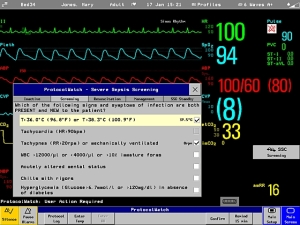Philips Introduces Transport Monitor
by Barbara Kram, Editor | February 20, 2007

ProtocolWatch brings evidence-based
protocols to the bedside
Click image to enlarge
protocols to the bedside
Click image to enlarge
Orlando, Fla. - Royal Philips Electronics (NYSE: PHG; AEX: PHI) announced the introduction of Philips ProtocolWatch, an application available on Philips IntelliVue patient monitors that applies patient monitoring data to evidence-based care protocols. This new clinical decision support application, as well as the newly released IntelliVue MP5 patient monitor for in-hospital patient transport, was showcased at the Society of Critical Care Medicine's (SCCM) 36th Critical Care Conference held this week in Orlando.
A new development in clinical decision support at the bedside, ProtocolWatch is the first application to deliver customer-specific care protocols on the patient monitor screen. ProtocolWatch responsively uses monitoring measurements to offer relevant screening and treatment information from evidence-based care guidelines.
The new offerings from Philips continue the company's effort to provide better means of summarizing and delivering patient monitoring information. Medical technology has given physicians overwhelming amounts of raw data to deal with. Philips sees its mission now as going beyond accumulation of data to design clinical decision support systems that give clinicians a clearer picture of what's happening with a patient.
ProtocolWatch streamlines the process of checking a patient's monitoring data against evidence-based care guidelines. It allows hospitals to use their IntelliVue patient monitors to implement care protocols, helping to elevate the standard of care and improve compliance with regulatory
mandates.
Helping clinicians combat severe sepsis
Severe sepsis is a condition in which the body's immune response to an infection spirals out of control, leading to organ dysfunction and death. It is the leading cause of death in non-coronary intensive care units. According to a 2001 study, sepsis has a mortality rate of 30 to 50 percent and an average cost per case of about $22,000 (Angus, DC et al., Crit Care Med 2001; Jul29(7):1303-1310). Complicating efforts to improve care, the symptoms of sepsis can appear similar to other conditions, resulting in diagnoses that can come too late.
In its initial release, ProtocolWatch brings the care guidelines developed by the Surviving Sepsis Campaign (SSC) to the Philips IntelliVue patient monitoring platform. The SSC protocol defines the physiological parameters that indicate the onset of severe sepsis. Since ProtocolWatch is built into the patient monitor, it can use the patient's vital signs to help clinicians screen for this deadly condition.
A new development in clinical decision support at the bedside, ProtocolWatch is the first application to deliver customer-specific care protocols on the patient monitor screen. ProtocolWatch responsively uses monitoring measurements to offer relevant screening and treatment information from evidence-based care guidelines.
The new offerings from Philips continue the company's effort to provide better means of summarizing and delivering patient monitoring information. Medical technology has given physicians overwhelming amounts of raw data to deal with. Philips sees its mission now as going beyond accumulation of data to design clinical decision support systems that give clinicians a clearer picture of what's happening with a patient.
ProtocolWatch streamlines the process of checking a patient's monitoring data against evidence-based care guidelines. It allows hospitals to use their IntelliVue patient monitors to implement care protocols, helping to elevate the standard of care and improve compliance with regulatory
mandates.
Helping clinicians combat severe sepsis
Severe sepsis is a condition in which the body's immune response to an infection spirals out of control, leading to organ dysfunction and death. It is the leading cause of death in non-coronary intensive care units. According to a 2001 study, sepsis has a mortality rate of 30 to 50 percent and an average cost per case of about $22,000 (Angus, DC et al., Crit Care Med 2001; Jul29(7):1303-1310). Complicating efforts to improve care, the symptoms of sepsis can appear similar to other conditions, resulting in diagnoses that can come too late.
In its initial release, ProtocolWatch brings the care guidelines developed by the Surviving Sepsis Campaign (SSC) to the Philips IntelliVue patient monitoring platform. The SSC protocol defines the physiological parameters that indicate the onset of severe sepsis. Since ProtocolWatch is built into the patient monitor, it can use the patient's vital signs to help clinicians screen for this deadly condition.
1(current)









